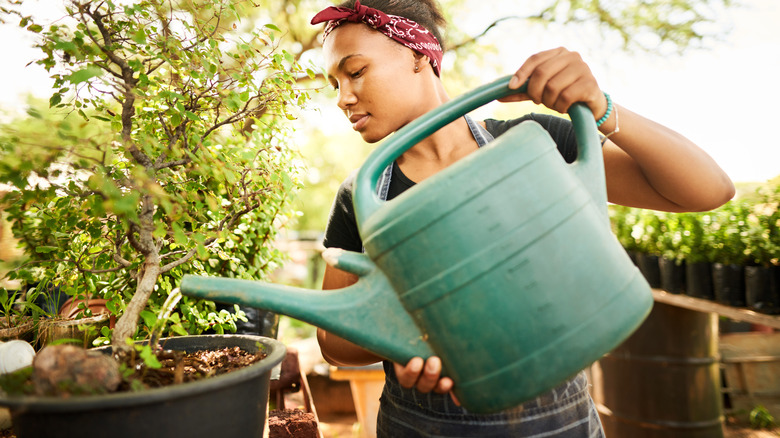The Kitchen Ingredient That'll Revolutionize Your Garden's Health
Gardening is supposed to be a relaxing hobby that's great for your mental and physical health, but that doesn't mean it won't have its stressful moments. Root rot is like a silent killer for plants and one of the most annoying problems to face when gardening. It slowly overwhelms and throws off the delicate microbe balance in the soil, eventually leading to shriveled, necrotic, and droopy plants. Even if your garden avoids this fate, you still have pests and hungry wildlife to contend with! Luckily, there may be one herb in your kitchen that can solve a multitude of pesky garden problems — even treat root rot. Enter ginger.
Delicious in smoothies, soups, stir-fries, teas, and more, ginger's disinfecting properties also make it an all-star ingredient for your garden's general health. Here's why you should be treating your garden with ginger and how to process this powerful herb into a form that your garden can use.
Zingy ginger fights pests and root rot
It should come as no surprise that ginger is chock-full of nutrients and anti-inflammatory compounds, considering that it is often used as a natural medicinal treatment. But zingy, spicy ginger doesn't just soothe a stomach ache, it also has powerful antimicrobial properties that fight bacterial and fungal infections. In the same way that it can fight illness and boost immunity in your body, it can also combat bad bacteria and fungal overgrowth around the roots of your plants.
Besides preventing root rot, adding diluted ginger to your garden's soil also acts like a natural fertilizer by helping the roots of your plants grow and improving nutrient absorption. Ginger root is also full of potassium, which is one of the essential nutrients that plants need to grow, reproduce, and resist attacks from pests. Zingerone, the compound that gives ginger its spiciness, can also deter common pests like caterpillars, grasshoppers, and nematodes.
How to use ginger in your garden
Throwing an entire ginger root into the soil isn't the best way to ensure your plants receive all its awesome benefits. Instead, you can incorporate ginger into your regular gardening routine by making ginger water. First, peel and grate fresh ginger root into a pot of boiling water, leaving it for at least ten minutes, brewing a sort of ginger tea. If you don't have fresh ginger available, you can try using dried ginger powder, but it may not offer the same boost of nutrients. After the time is up, let the water cool before straining it into a sealable container to be stored in the fridge. Next time you go to water your plants, mix in one cup of ginger water for every three cups of plain water, then direct the stream around the roots of indoor and outdoor plants, herbs, and flowers.
After making your ginger water, save those peels and any leftover solids. You can mix these into your compost pile, just be sure to do so in moderation and chop up the peel as much as possible. The tough peel can take a long time to decompose, and the pungent flavor of ginger can be off-putting to beneficial worms.


